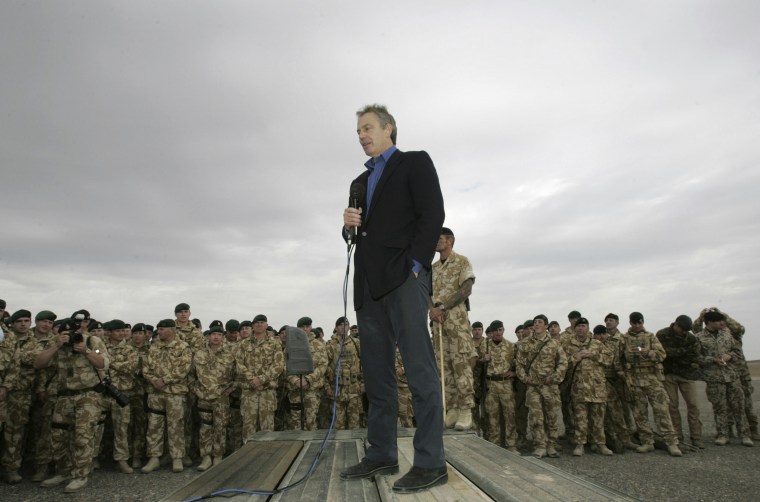The security of the world will be decided on the desert battlefields of Afghanistan, British Prime Minister Tony Blair on Monday told his troops on the frontline of an increasingly bloody war.
“Here, in this extraordinary desert, is where the future of world security in the early 21st century is going to be played out,” Blair told his troops in remarks barred from publication until he flew out of Camp Bastion in Helmand province.
Afghanistan’s western allies say the Taliban is on the run, despite a resurgence, but Blair’s long-planned visit has been kept in strict hour-by-hour secrecy due to security fears.
“You may not know this, but people back home are very proud of what you do, regardless what they think of political leaders,” he told troops in the desert province that is a Taliban stronghold and the opium capital of the world’s main producer.
Fighting in Afghanistan this year is the bloodiest since U.S.-led forces ousted the Taliban’s hardline government exactly five years ago. The British troops in Helmand and other NATO troops in the south have been at the forefront of the combat.
And with the rise in fighting and a redeployment to the Taliban’s southern heartland, British casualty rates here are now higher than those in Iraq, with 36 killed since June.
British Gen. David Richards, the head of the NATO-led International Security Assistance Force, has said his countrymen in Afghanistan face the bloodiest fighting since the Korean War and are six times more likely to die in Afghanistan than in Iraq.
“We want to be here. We want to be doing our job,” Sgt. Chris Hunter, 31, from Swansea, Wales, told Blair at Camp Bastion in the chill morning air of an Afghan winter.
“It’s a point that’s lost back home,” Hunter said.
Talks with Karzai
Blair also signed a drone reconnaissance plane at the base.
“I hope it doesn’t get shot down, sir,” joked one soldier.
Blair was to meet President Hamid Karzai in Kabul at the presidential palace before flying back to Pakistan.
He flew in from Islamabad, where he had met President Pervez Musharraf to discuss how to beat the Taliban, pool intelligence and quell militancy in Pakistani religious schools.
The Taliban’s resurgence also comes amid mounting debate over Western policy in Iraq and NATO warnings that it cannot defeat the insurgents on the battlefield.
On Friday, Blair agreed with an Al Jazeera television interviewer’s contention that the Western intervention in Iraq had been a disaster — although he went on to point the finger at outside forces fomenting sectarian violence, and his office later said he had not meant to endorse the questioner’s view.
Senior Afghan officials also privately criticize Britain, the United States and other allies for not putting more pressure on Pakistan to stop the Taliban and other militants sheltering and training in its lawless borderlands.
Pakistan says it is doing everything it can to stop the militants, as it does in the face of similar Indian criticism over Kashmiri separatists operating from Pakistani territory.
But senior Afghan intelligence officials say they have given Washington and London clear evidence of continued Pakistani government support of the Taliban, but have been ignored.
